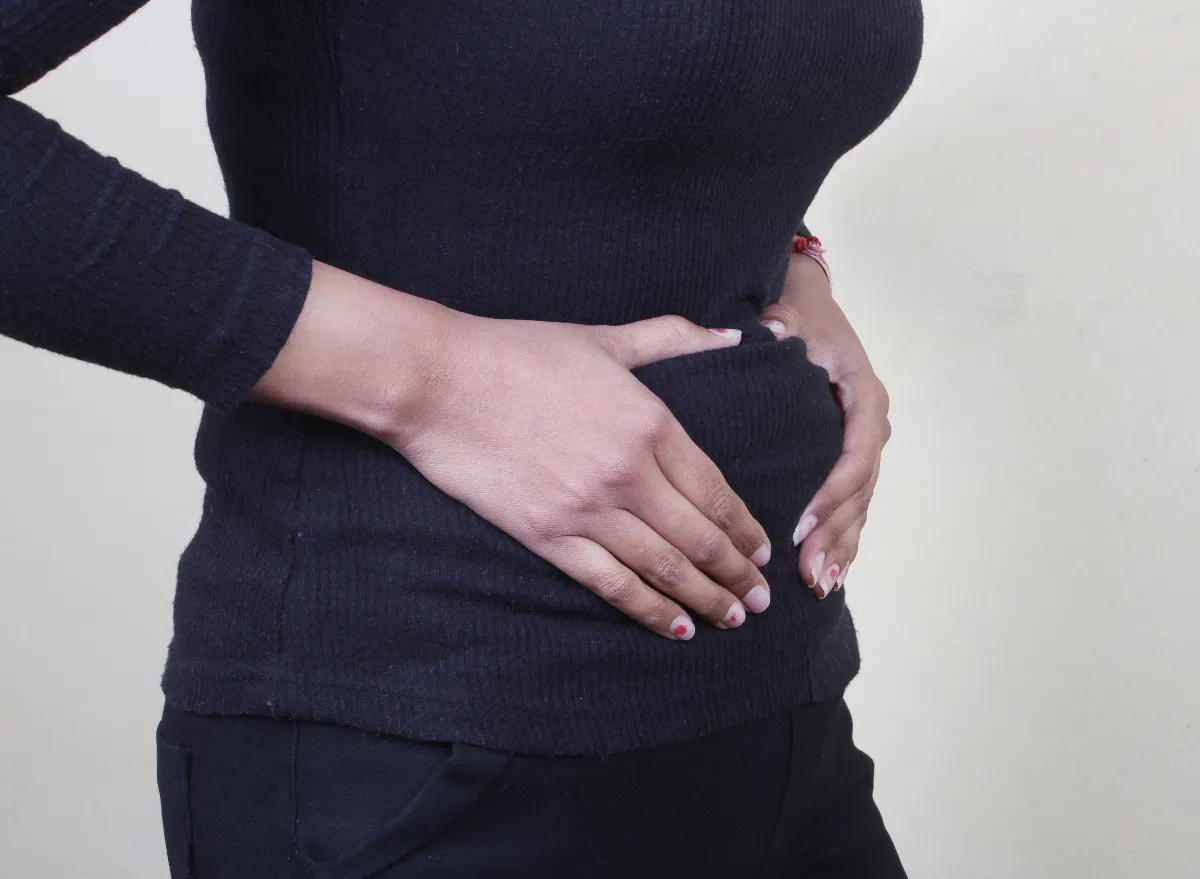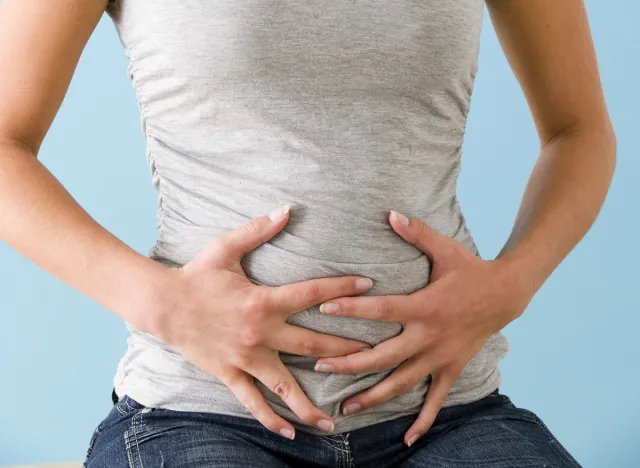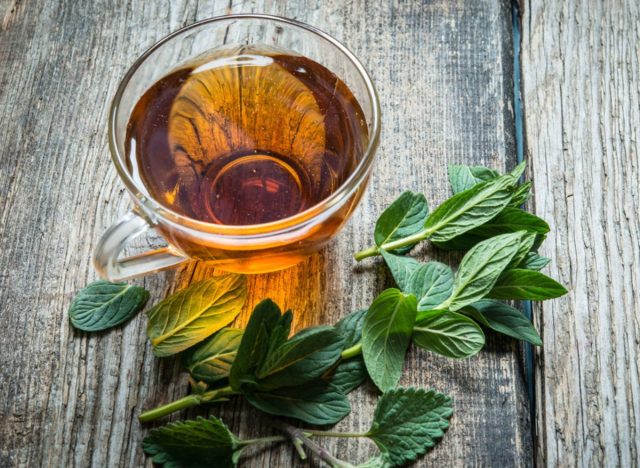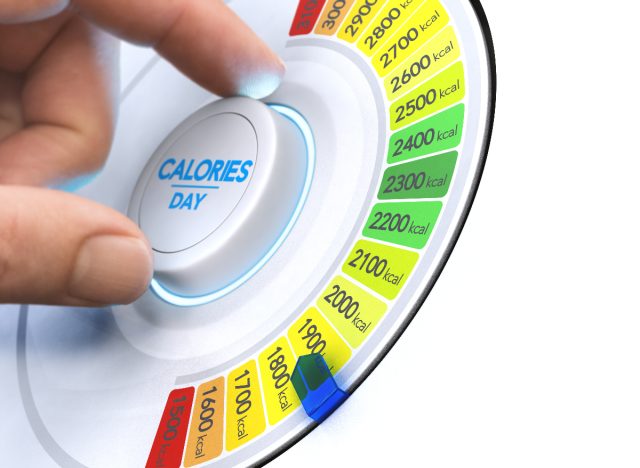
Let's be honest: Navigating the sea of online information about belly fat and bloating can be tricky. It's also easy to confuse the two, especially when you find out that nearly three-quarters of U.S. adults are overweight or obese, and one out of seven Americans experience bloating weekly. So, how can you distinguish between these common and uncomfortable midsection woes? To find out, we consulted Destini Moody, RDN, CSSD, LD, a registered dietitian and sports dietitian with Garage Gym Reviews, who shares expert wisdom to help you determine whether you have belly fat or bloating.
Belly fat is often a result of various factors like diet, genetics, and lifestyle. The downsides of extra cushion around your midsection extend far beyond aesthetics. According to the National Heart, Lung, and Blood Institute, excess abdominal fat increases your risk of developing heart disease and type 2 diabetes. Conversely, bloating is a temporary and often uncomfortable condition caused by the buildup of gas or fluid in the digestive system. It can make your stomach feel swollen, distended, and uncomfortable, but it's usually not a long-term concern.
In this article, we'll distinguish between belly fat and bloating to help you identify each condition, understand their potential causes, and discover practical tips to address them. Read on to learn more, and when you're finished, check out The Ultimate 30-Day Belly Fat-Melting Plan for Beginners.
Here's how to tell the difference between bloating and belly fat.

To distinguish between bloating and belly fat, Moody suggests paying attention to how your abdomen feels throughout the day. If your stomach expands and contracts, it's likely bloating, often caused by gas or fluid retention. In contrast, consistent bulging may indicate belly fat, which tends to be firmer.
"If you have gained more than two pounds in 48 hours or less, it's likely bloating," Moody explains. "The body takes some time to register extra calories enough to store them as belly fat, and it takes longer than a day for these tissues to form. If you've recently taken a new supplement, like creatine, eaten a very high sodium meal, or been on a long flight, you've experienced some fluid shifts that can result in bloating significant enough to seem like fat."
Here's how to address bloating.

Combatting bloating involves more than just waiting it out. Moody recommends incorporating anti-bloating beverages like ginger or peppermint tea into your routine. Research suggests these natural remedies soothe the digestive system and alleviate gastrointestinal discomfort.
Steering clear of sodium can also help reduce bloating, as studies show that high-sodium meals and foods cause water retention, which can lead to bloating. Another way to combat bloating is through regular exercise—especially activities that induce sweating, which causes your body to release excess fluids, leaving you feeling lighter and more comfortable.
Here's how to address belly fat:

Tackling belly fat requires a comprehensive lifestyle approach. According to Moody, prioritizing a high-quality diet low in saturated fat, processed foods, refined carbs, and added sugar is essential. This targeted nutritional strategy discourages abdominal fat gain.
Moody adds that controlling your overall calorie intake is another critical factor in addressing belly fat, as this prevents excess weight gain across the body. For optimal fat burning, engage in a balanced fitness routine that combines resistance training with cardio exercises, helping build a sculpted and toned midsection.
Practical tips for a healthy midsection:

Consider these additional tips to help you recognize whether your stomach bulge is coming from bloating or belly fat.
1. Prioritize gut health.
Incorporate probiotic-rich foods like kimchi, sauerkraut, tempeh, and yogurt into your diet to support a flourishing gut microbiome. According to research, a healthy gut can improve digestion, reduce bloating, and lower chronic disease risk.
2. Stay hydrated.
Contrary to popular belief, drinking water can actually help reduce water retention. Ensure you're sipping on water throughout the day—especially when you consume foods high in sodium, to flush out excess fluids and alleviate bloating.
3. Practice mindful eating.
Adopting mindful eating habits can address both bloating and weight loss, which can lead to belly fat loss. Try eating slowly, savoring each bite, and paying attention to your body's hunger and fullness cues. This approach can aid digestion and prevent overeating, supporting healthy weight management and reducing bloating.
4. Manage stress.
According to research, chronic stress can contribute to both belly fat accumulation and abdominal bloating. It's important to find the source of your stress and address it effectively. In addition, consider incorporating stress-reducing practices into your daily routine. Activities and hobbies such as meditation, yoga, deep-breathing exercises, and even taking a soothing bubble bath can help you get a handle on your stress, which in turn will aid in shedding weight and combatting bloating.
- Source: https://www.cghjournal.org/article/S1542-3565(22)01020-5/pdf
- Source: https://www.ncbi.nlm.nih.gov/pmc/articles/PMC6341159/
- Source: https://www.ncbi.nlm.nih.gov/pmc/articles/PMC7122060/
- Source: https://www.ncbi.nlm.nih.gov/pmc/articles/PMC8035544/
- Source: https://www.ncbi.nlm.nih.gov/pmc/articles/PMC4425030/
- Source: https://www.ncbi.nlm.nih.gov/pmc/articles/PMC7219460/
- Source: https://www.ncbi.nlm.nih.gov/pmc/articles/PMC3107005/
- Source: https://www.ncbi.nlm.nih.gov/pmc/articles/PMC6824367/









